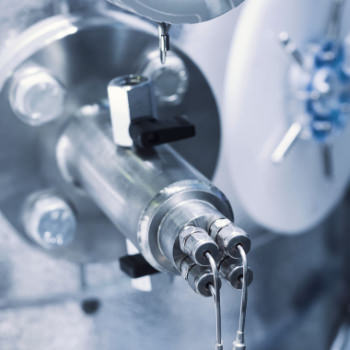
The ability to collect data on production processes is the key for the realization of the idea of Industry 4.0. Modern sensors constitute the basic tool for automatic acquisition of data about operation of machines and course of industrial processes. Sensors manufactured in the MEMS technology (micro-electro-mechanical systems), as compared to traditional sensors, are characterized by small size, low energy consumption and high reliability. They can be used to measure various parameters, such as temperature, pressure, torque, liquid level or displacement of objects. Wireless communication technologies allow such sensors to transmit data in real time to enterprise servers or to cloud computing resources.
While supplying comprehensive IT solutions for production and logistics, Quantum may also supply a wide spectrum of industrial sensors that have multiple applications in a variety of industrial branches. Such sensors may function as components of such comprehensive systemic solutions as, for instance Qguar MES or Qguar WMS. The sensors may also be installed independently, i.e. they do not require to be integrated with larger-scale software solutions.
Smart industrial sensors: types and applications
Temperature sensors
Temperature is one of the most frequently measured physical parameters within industrial production processes. Depending on the environment and scope of the measurement, we will help select the best-fitted type of sensors (semi-conductor based, thermocouples, resistance temperature detectors). A temperature sensor may be integrated with other detectors to form more extensive monitoring modules. Among most frequent combinations, one finds integrated sensors of temperature and humidity.
Temperature sensors find a wide range of applications in various industry branches, such as medical, pharmaceutical, food production, printing or plastics industries.
Pressure sensors
Pressure sensors convert the physical quantity of pressure into an electric signal. They consist of an element that is sensitive to pressure, and a signal processing unit. Pressure sensors are used in power-generation industry and petrochemical industry, where they support operation of injection units. These sensors may also be used to monitor pipelines and detect medium leakage incidents.
Inductive sensors
Inductive sensors find their applications wherever non-contact detection of the position of metal objects is required. The range of detection depends on sensor construction. We offer sensors designed for hygienic applications (food and pharmaceutical industry), sensors designed to work under high pressure or in explosion hazard zones (EX). Inductive sensors are most frequently used in machine, electronic, automotive and food industries.
Capacitive displacement sensors
Capacitive sensors are used to detect objects irrespective of the material they are made of. As opposed to inductive sensors, they do not assess object position on the basis of variations in the magnetic field, but on that of capacity variations. Capacitive sensors determine the level of liquids, granulated products and powders, with which they are in direct contact or which they detect through non-metallic tank walls. Thanks to their versatility, they can be adapted to the shape of a housing, on which they are affixed.
Ultrasound sensors
Ultrasound sensors are implemented to determine position of objects or to identify objects. Irrespective of the specific task – be it determination of position, measurement of distance or detection of solid, powdered or liquid media – ultrasound sensors provide a precise and universal solution.
Optoelectronic sensors
Optoelectronic sensors are used to detect the presence of a variety of types of objects in a reliable manner. They are able to perfectly control shape, colour, distance or thickness of an object. All these tasks are realized with high precision, because their range of detection is much larger, compared to proximity sensors based on inductive or capacitive technologies.
Our offer covers sensors that support all types of light, from red light through infrared light up to laser light technology. Optoelectronic sensors can be characterized by different ranges of operation and by the capability of suppressing the background. Many available construction types of sensors ensure high flexibility of their application.
Magnetic field sensors
Magnetic field sensors are implemented primarily to control piston position in cylinders or robot end effectors. Such a sensor detects the field of a magnet integrated into a piston through the housing wall, on which it is installed. Due to non-contact determination of object position, magnetic field sensors operate in a reliable manner and they are not subject to wear due to friction, while their reading is not distorted by interference at their contacts.
Machine condition monitoring sensors
Machine condition monitoring sensors allow one to prevent failures and unplanned downtimes. These smart sensors provide data concerning machine condition and potential anomalies in machine operation. Data collected by such sensors can be used to eliminate expensive and time-consuming manual check-ups and inspections. Machine condition monitoring sensors allow companies to implement predictive strategies of maintenance. Condition monitoring sensors offered by our company provide the possibility of monitoring multiple variables of machine operation (vibrations, temperature, humidity, air pressure) within a single unit.